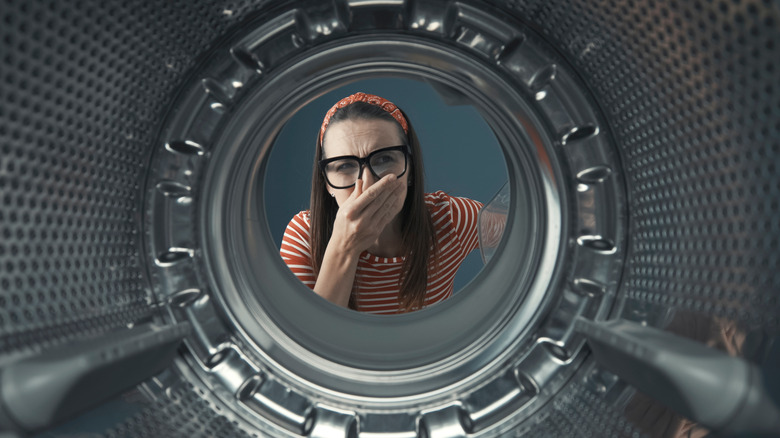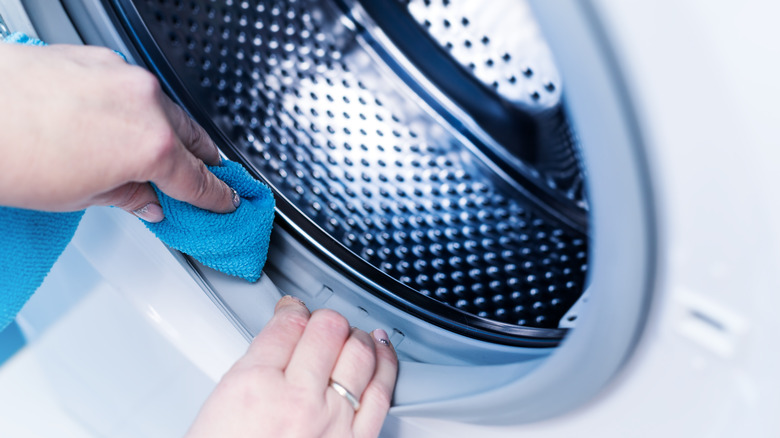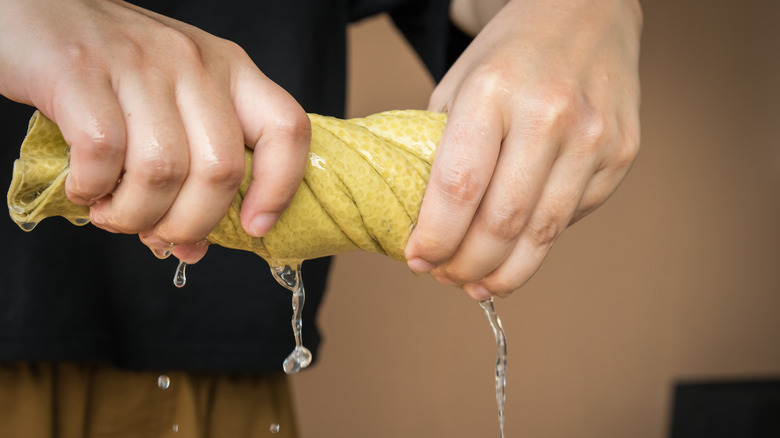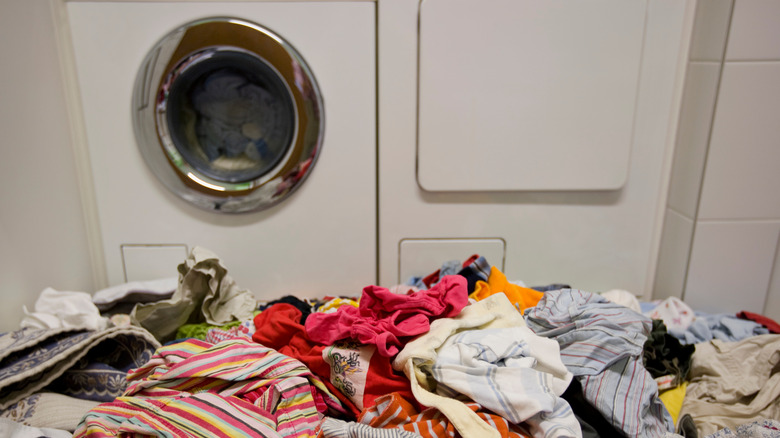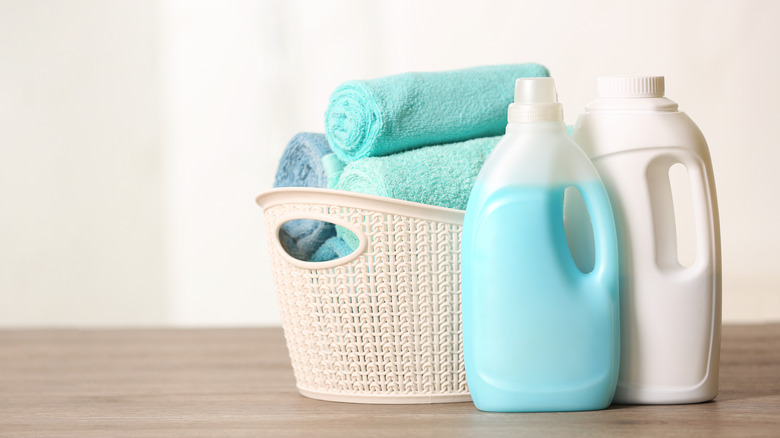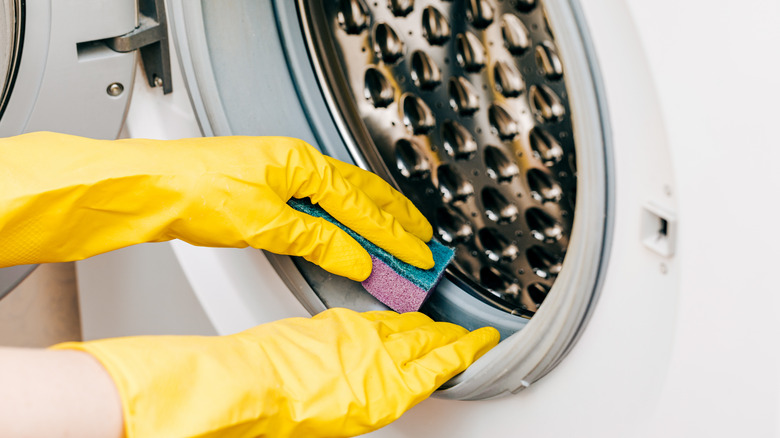Why Your Washing Machine Smells And How To Fix It, According To An Expert
Doing your laundry every week may seem like a nagging chore, but there's something to be said for that rewarding wonderful scent of a warm, dry, fresh load as soon as you pop it out of the dryer. Besides, when it comes to tasks around the home, laundry isn't all that bad — right? According to a survey done by the American Cleaning Institute, those who participated actually said that laundry was their favorite cleaning chore around the home.
Because your washing machine has the sole purpose of cleaning, folks may often forget that they need to maintain and clean the appliance itself. Without proper care, your washer could break down or even create a funky smell, which is the last thing you want to emit from a cleaning machine. If you are perplexed by the foul odor coming from your washer, don't panic. In an exclusive interview with House Digest, Founder of Diamond Appliance Repair of Appleton, Wisconsin, Jim Schmid gave us his insight into the pungent washer problem, explaining "a foul smell coming from your washing machine can be caused by a variety of issues, and it is important to identify and address the problem quickly."
The drum is dirty or there's lint buildup
One of the major reasons why washing machines begin to smell is because they are not clean. Schmid has narrowed down some of the major causes, saying. "The inside of your washing machine can accumulate dirt, detergent residue, bacteria, and mildew over time if it isn't properly cleaned and maintained. The accumulated grime and residue can cause the musty odors that are common in dirty washers." To take care of this issue he suggests that you should "clean the inside of your drum regularly with an all-purpose cleaner or vinegar diluted in water." Vinegar is an inexpensive and all-natural cleaner that can kill odors at the source, without being damaging the internal parts of your washer.
Schmid also mentions that "lint buildup is another common culprit behind smelly washing machines." To address this issue, he notes that homeowners need to "make sure to clean out the lint filter after each load of laundry to keep lint accumulation under control." This should help get rid of the smell, but for continued odor-free washing, it should become a normal part of your routine. "Additionally, regularly wipe down both the inside and outside of your machine with an all-purpose cleaner to reduce any lingering smells that might come from leftover lint particles," Schmid suggests.
Damp towels can be a culprit
A bad smell might be due to the items that are put in the machine rather than the machine itself. Schmid points out, "a damp towel is a great place for mold and mildew growth which often leads to unpleasant odors coming from our washers. To prevent this from happening make sure you dry off wet towels completely before putting them in the washer or ensure you hang-dry them afterward before storing them anywhere damp or humid." Although it may seem strange to dry an item just to then put it right back into the wash, you don't want the residual mold to reach the inside of your washing machine.
Because mold and mildew thrive in dark, moist, and warm environments this makes the washer an ideal space for it to grow and spread. If you notice mold or fungus growing on any items, whether it is a towel, linen, or clothing, you should treat the area before placing it in the washer. Fabric-safe bleach can kill the bacteria as well as rid your items of any stains that they may have caused, which will ensure that your articles come out clean and disinfected.
You're overloading your machine
Wet clothing or towels add a heavy burden to your washer. This additional weight may damage the drum of your machine, causing it to run unbalanced, which could cause permanent damage. However, just the act of placing too many items into your washer can also result in some additional smelly issues. "Make sure you don't overload your machine as inadequate air circulation could lead to moist items left behind in the drum which may cause odors, too," Schmid warns. "Overloading may also leave behind drips that can encourage bacteria build-up, leading to bad smells emanating from the exterior or interior of your machine over time."
Although everyone wants to make the most out of every load of laundry, your appliance has its limits and they shouldn't be pushed to the threshold. By placing too many items in your washing machine you are also not allowing the water and laundry soap to pass easily through the whole load. This means that not every article is being cleaned properly and that soap residue may cling to other items. Instead of overloading your laundry, Schmid explains that "keeping loads at moderate levels will help keep bad odors away while still allowing for adequate cleaning power within each cycle."
You're using the wrong cleaning products
Because every load of laundry may be different in size, weight, color, and materials, you have to determine the exact amount of soap needed to get the job done. However, "some cleaning products may also leave behind residue on fabrics during certain wash cycles, which can lead to odor build-up when not washed thoroughly enough or at high temperatures suitable for killing these germs off entirely," Schmid notes.
He also goes on to point out that "it is important to always check labels on detergents, carefully paying attention when necessary on recommended dosages." Not only will following directions help to ensure that you are not left with odor-causing remnants, but it will also result in your clothes looking and smelling their cleanest.
Properly measuring the detergent will also make certain that your washer's soap dispenser does not get clogged up with extra product. If left untreated, this gunky, sticky, and smelly build-up can cause blockage for your future loads of laundry and not allow the soap to pass through the next cycle. Schmid also advises that you "use caution around high-temperature settings, as certain fabrics may suffer damage due to exposure within high-heat dryer cycles."
It's time for a deep cleaning
Just like any other appliance, a washing machine won't last forever and may require some expert attention. "If regular maintenance still isn't helping eliminate bad smells coming from our machine, then perhaps it's time for a deep clean using a professional service," Schmid recommends. "Or, you can even just disassemble parts such as filters, drums, etc. for a thorough scrubbing using specialized cleaners — perfect for getting rid of those hard-to-shift stains and lingering odors."
Make sure that you are using products that are safe for your washing machine. It would do you some good to research the cleaners to ensure that they are meant to be used on your particular appliance. Sticking to a washer cleaning routine once a month is a good way to keep your appliance free of debris and bad odors, and be sure to wipe down the inside and outside with a microfiber cloth so that no moisture is left. That way no bacteria can be free to form in the damp environment.
